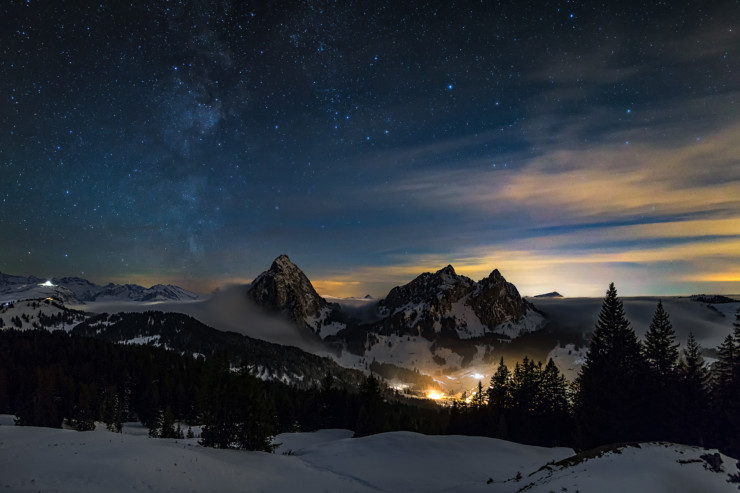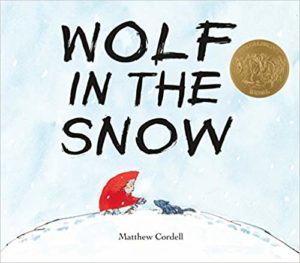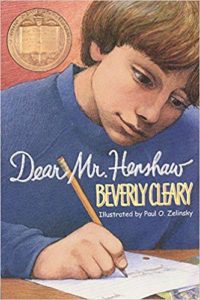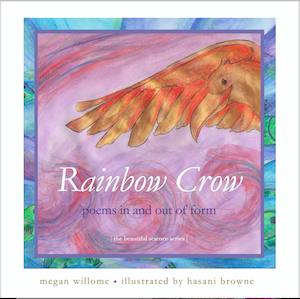Winter is almost over, forever. And I am in mourning. No more dragons of ice and fire! No more direwolves! To console myself I read an almost-wordless picture book by Matthew Cordell titled Wolf in the Snow. It’s about about winter and wolves and a brave little girl.
Like most of my great finds, it was on the returns cart at the library. I fell in love with it, and when I went online to order it for a family member who lives in Jackson Hole, Wyoming, I saw it won the 2018 Caldecott Medal. I guess my library hadn’t gotten around to affixing the sticker.
The story starts five pages before the title page. That quirk made me pay more attention to the front matter. The dedication reads, “For my brave girl, Romy.” The Acknowledgements say, “Special thanks to Kira Cassidy of the Yellowstone Wolf Project for taking the time to answer in depth my questions about wolves and wolf behavior.”
I have a lot of family who live not far from the Wyoming entrance to Yellowstone National Park. My uncle was a marine biologist for Wyoming Game & Fish, and every visit with him was an education in ecology, the poetic connectedness of earth.
But it’s one thing to admire wolves in a park. It’s another thing to be a little girl, lost in the snow, who encounters a wolf pup and, eventually, a wolf pack.
The girl has no name. The wolves have no name. The family dog has no name, and neither do the parents. But even without such important words, we have everything we need with the illustrations.
The wolves have a snarl and a swagger about them — it’s what keeps them alive. But the wolf pup looks vulnerable, like a slightly wild puppy. As we see the pack interact with its junior member, we see these creatures in a more complicated light.
This almost-wordless picture book includes twelve words, some of which are repeated: “school” (posted on a sign), “huff,” “whine,” “sink,” “howl,” “growl,” “screech,” “Rrrr,” “sniff,” “lick,” “bark,” and “?…” (which works as a complete sentence). We need this dynamic dozen. Through font size and exclamation marks, these words convey volume — a key consideration because sound travels differently across a snow-covered plain.
When the girl in the red coat spies the lone wolf pup crying “whine whine,” she makes a “huff huff” sound, either from sweating or from crying. (Frankly, either alternative makes sense.) She hears the pack’s “hoooooooooooooowwwllll” and decides to return the pup. It’s a scary journey, in which she encounters other animals who defend their territory.
There are two two-page spreads dedicated to the girl’s meeting with the mama wolf. In one, she’s holding the pup, who has his mouth open, as if he’s calling out, while the mama wolf approaches the child, head and tail down. You’ve heard of mama bear? Meet mama wolf, no less fierce.
The next spread is two close-ups: one, of our brave girl, her eyes as wide as they can possible be, the wolf pup howling in her arms. In the other, the mama wolf’s yellow eyes stare into our souls.
As the girl returns the wolf pup, we get a suggestion of more wordless words, just a couple of scraggly lines, like noise erupting out of her entire body. The girl then collapses onto her hands and knees in the snow, exhaling a puff of air, dripping while more snow drips around her.
I won’t spoil the rest of the book, but it has a most happy ending. Barks and licks and howls and well-placed flashlights tell the rest of the story. The final illustration mirrors the first.
This month Tweetspeak Poetry is doing a 30 Day Challenge for Poetic Earth Month, combining our love for National Poetry Month with our love for Earth Month. This story reminds us that we all live together on this earth — wolves and girls in red coats and dogs and parents. This land is your land, this land is my land, and this land is wild and wonderful.
Next time I’m in Yellowstone, I’ll listen a little more closely as I huff along. And I will wear my red coat because even in summer, there can still be snow in the north.
_______________
The next Children’s Book Club will meet Friday, May 10. We will read Newbery Award-winner and Callie Feyen-approved Dear Mr. Henshaw, by Beverly Cleary, illustrated by Paul O. Zelinsky.
Photo by Lukas Schlagenhauf, Creative Commons, via Flickr. Post by Megan Willome.
Browse more Children’s Book Club
“Megan Willome has captured the essence of crow in this delightful children’s collection. Not only do the poems introduce the reader to the unusual habits and nature of this bird, but also different forms of poetry as well.”
—Michelle Ortega, poet and children’s speech pathologist
- Perspective: The Two, The Only: Calvin and Hobbes - December 16, 2022
- Children’s Book Club: A Very Haunted Christmas - December 9, 2022
- By Heart: ‘The night is darkening round me’ by Emily Brontë - December 2, 2022




L.L. Barkat says
“But it’s one thing to admire wolves in a park. It’s another thing to be a little girl, lost in the snow, who encounters a wolf pup and, eventually, a wolf pack.” So true. Our context makes all the difference. (In a vaguely similar manner…the other day I was thinking that it was one thing to witness the fierce storm through my window but it would have been another thing entirely if I’d had no home to shelter me.)
I loved hearing that about your uncle! 🙂
Megan Willome says
The state of Wyoming lost a great man when Mark Fowden, Chief of Fish, passed away in 2017. I am happy report the granddaughter he never got a chance to meet loves the book.